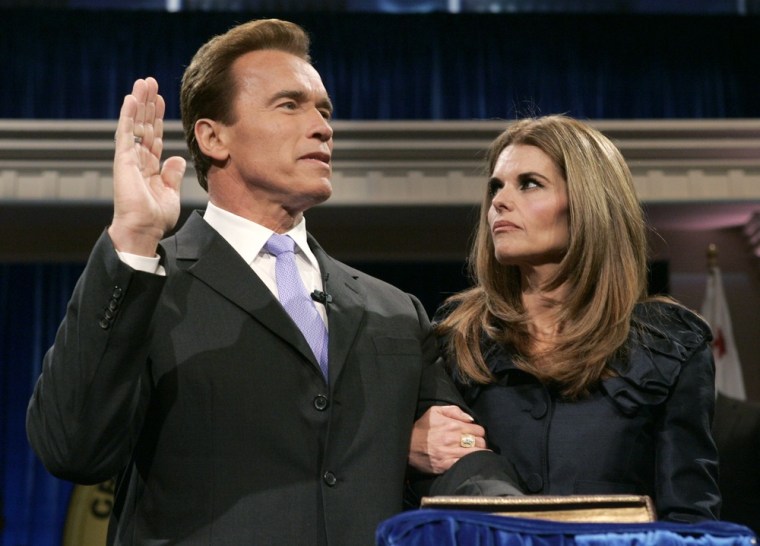When Maria Shriver and Arnold Schwarzenegger announced they were splitting up last week, their reasoning went beyond the standard “we’ve-grown-apart” line. Instead, they put some of the blame on their careers.
“This has been a time of great personal and professional transition for each of us,” the couple wrote in a statement to the Los Angeles Times. “After a great deal of thought, reflection, discussion and prayer, we came to this decision together.”
Indeed, both members of this power couple are in serious career transition. Schwarzenegger recently left his big gig as governor of California and is reportedly looking to return to his movie star fame. Shriver has been become increasingly focused on her advocacy work, including Alzheimer’s research and women’s empowerment.
While we’ll never know exactly why they separated — and Schwarzenegger’s widely reported history of groping other women may have played a role — this type of career change can do a number on almost any relationship, according to divorce attorneys and career-management and relationships experts.
“Major life transitions, especially career transitions, are stressful, and that stress often bleeds into the marriage,” said Bradford Wilcox, director of the National Marriage Project at the University of Virginia.
It’s often an issue of loss of control.
“The challenge is that high need for achievement professionals often run from transition because they can’t always control the outcome,” said Thomas DeLong, professor of management at Harvard Business School and author of forthcoming book “Flying Without a Net: Turn Fear of Change into Fuel for Success.”
“Thus, when forced to change they often act out and overreact because the fear of change frightens them so much,” DeLong added.
He offers an example of an executive he interviewed for his book. The exec was going through a career change and “his kids knew to head for their rooms when he arrived home because he was so overly sensitive and almost despondent,” he said. “When the individual feels out of control they just don’t sink a little bit, but fall off a cliff of self-criticism and judgment.”
Financial issues, ego and equity all can come into play.
“For couples who are losing jobs, or going on to new jobs, especially if they’re less prestigious or remunerative, it can be a real source of strain on a marriage,” Wilcox continued.
“The second thing is the blow to the ego; this is particularly true for men who have established lifetime and marriage, making major contributions to the family,” he added.
And then there’s the issue of one spouse feeling they sacrificed for the other.
“Often women feel they’ve made more sacrifices,” he said.
Family law attorney Lynne Gold-Bikin said the number-one professional change that impacts the couples she sees is income, followed by a change in schedule. Maybe one partner is working nights and the other partner is working during the day. Suddenly their schedules shift and they’re together more often.
“They were ships that passed in the night and suddenly they’re together,” she said, adding that they discover they don’t really like each other that much.
This scenario happens a lot when one spouse retires, she said.
“We kid around and say, ‘For better or worse, but not for lunch,’” she quipped.
So how do these shifts manifest themselves in relationship problems? Karol Ward, a licensed psychotherapist and author of “Worried Sick: Break Free from Chronic Worry to Achieve Mental & Physical Health” offered a list of the reasons career changes can lead to divorce:
- One or both cannot handle the original and defined roles of the relationship that are now changing
- One person may not be able to handle the other becoming more successful and leaves
- Sometimes one half of the couple cannot handle the other person struggling and becomes resentful.
- Sometimes one person cannot handle the uncertainty that career transitions involve. They may want security and answers when there may not be any.
- One person in the relationship may turn to destructive behavior, become depressed or anxious, and if this goes on for a period of time, untreated, it creates strain on the relationship — sometimes enough for the other person to leave.
Joyce Morley, a psychotherapist and executive coach, worked with a president of a Tennessee company who was in his late 40s and deciding whether to sell his business. The stress from that decision wreaked havoc on his marriage.
“He was becoming a meanie,” she said, “because he didn’t know how to handle what was going on. He thought he’d lose his sense of status and was wondering what people were going to feel about him, whether his wife would care for him the same, or treat him differently.”
Morley helped him to realize he was taking his fears out on his wife, and he recognized how much he wanted to save the marriage.
“He was able to hold it together,” Morley said.
Sometimes it’s not about stress or fear; it's about wanting something new.
“Career change gives a lot of couples the opportunity to make relationship changes,” Morley said. “Once a career is over it’s an opportunity to go in a different direction with your personal life. That obligation doesn’t have to be there anymore.”
Morley said this is particularly true for individuals in the spotlight — such as politicians, or high-powered executives — who are expected to have spouses by their sides.
And for average people, she continued, the end of a career (or the beginning of a new one) can also be thought of as a time to reassess relationships.
“Women usually say they’re trying to find themselves, and for men it’s usually about wanting something new, or to explore,” Morley said. “Maria may be saying, ‘Now it’s time for me to find my way,’ and maybe Arnold is thinking about what he’s going to do now.”
